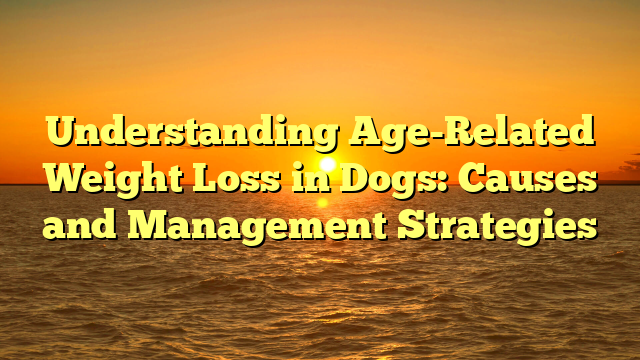
Understanding Age-Related Weight Loss in Dogs: Causes and Management Strategies
As dogs age, they often experience various health changes, including alterations in weight. Age-related weight loss in dogs can be a concern for pet owners, signaling underlying health issues or the need for dietary adjustments. This article explores the causes of age-related weight loss in dogs and outlines effective management strategies to ensure your aging pet remains healthy and happy.
Causes of Age-Related Weight Loss in Dogs
Several factors contribute to weight loss in older dogs. Understanding these causes is crucial for addressing the issue effectively.
Dental Problems
As dogs age, they are more susceptible to dental issues such as tooth decay and gum disease, which can make eating painful and lead to weight loss.
Chronic Diseases
Chronic conditions like diabetes, kidney disease, and cancer are more common in older dogs and can result in significant weight loss.
Decreased Metabolism
Metabolism naturally slows down as dogs age, affecting their ability to maintain weight even with a consistent diet.
Reduced Appetite
Age can also decrease a dog’s sense of smell and taste, reducing their appetite and subsequent food intake.
Management Strategies for Age-Related Weight Loss
Effectively managing age-related weight loss in dogs involves a combination of veterinary care, dietary adjustments, and lifestyle changes.
Veterinary Care
Regular check-ups with a veterinarian are essential for monitoring your dog’s health and identifying any underlying causes of weight loss.
Dietary Adjustments
Adjusting your dog’s diet can help manage weight loss. Consider the following tips:
- High-Quality Diet: Feed your dog a high-quality diet rich in nutrients.
- Small, Frequent Meals: Offering smaller, more frequent meals can help stimulate appetite.
- Supplements: Dietary supplements may be recommended by your vet to ensure your dog gets the necessary nutrients.
Lifestyle Changes
Maintaining an appropriate level of physical activity is crucial for aging dogs. Gentle exercise can help manage weight and improve overall health.
Monitoring Your Dog’s Weight
Keeping a close eye on your dog’s weight is crucial for early detection of issues. Regular weigh-ins and body condition scoring can help track changes over time.
When to Consult a Veterinarian
If you notice any sudden or unexplained weight loss in your dog, it’s important to consult a veterinarian immediately. They can help identify the cause and recommend a treatment plan.
Conclusion
Age-related weight loss in dogs can be a sign of underlying health issues or the need for dietary and lifestyle adjustments. By understanding the causes and implementing effective management strategies, you can help ensure your aging dog maintains a healthy weight and quality of life.
FAQs
How often should I weigh my aging dog?
It’s recommended to weigh your aging dog at least once a month to monitor any changes in weight.
Can exercise be harmful to older dogs?
While exercise is beneficial, it’s important to adjust the intensity and duration to suit your dog’s age and health condition. Consult with a vet for personalized advice.
Are there specific breeds more prone to age-related weight loss?
While any dog can experience age-related weight loss, some breeds may be more susceptible to conditions that cause weight loss as they age. Regular veterinary care can help manage breed-specific issues.
| Adjustment | Benefit |
|---|---|
| High-Quality Diet | Ensures nutrient-rich intake |
| Small, Frequent Meals | Stimulates appetite and aids digestion |
| Supplements | Addresses nutritional deficiencies |






